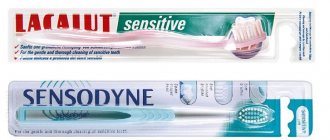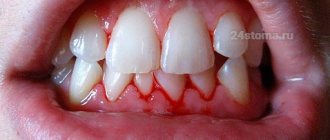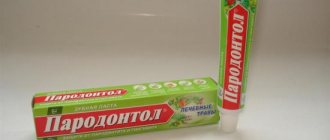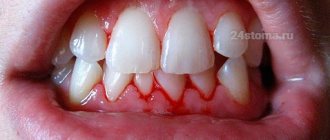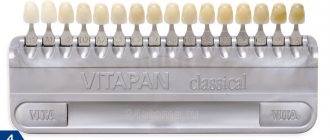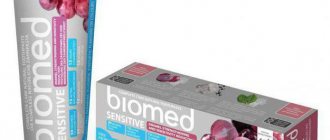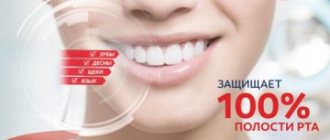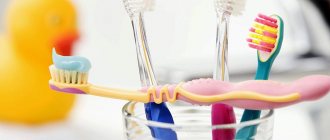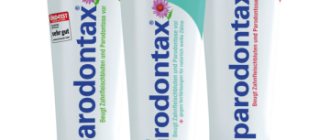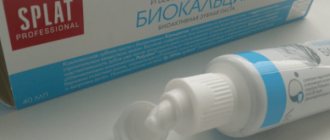As a rule, when purchasing toothpaste, few people select this hygiene product based on their own oral problems.
To a greater extent, the consumer of this product is driven by the brand and reputation of the manufacturer; some pay attention to the cost and only a few read the composition and effect of each component.
We invite you to get acquainted with the not so popular Mexidol Dent toothpaste, which has won recognition among people who care about what kind of means to carry out daily oral hygiene.
Composition and release form
Active ingredient: ethylmethylhydroxypyridine succinate – 50 mg. Excipients: sodium metabisulfite – 0.4 mg; water for injections up to 1 ml. Solution for intravenous and intramuscular administration 50 mg/ml in colorless or light-protective glass ampoules with a blue break point or a white break point and three marking rings (top - yellow, middle - white, bottom - red) 2 ml or 5 ml . 5 ampoules in a blister pack. 1 or 2 blister packs along with instructions for medical use in a cardboard pack. 4, 10 or 20 blister packs along with instructions for medical use in a box of cardboard (for hospitals).
Advantages
The popularity of the pastes produced by this manufacturer has been facilitated by a number of advantages that they possess. The main thing among them is that they all do not contain fluorine and chlorhexidine.
To avoid undesirable consequences, pastes must be used in the correct dosage. It has been proven that excess fluoride can provoke the development of such a dangerous disease as fluorosis, which is accompanied by changes in the structure of the enamel. Also, if this component enters the body excessively, disruptions in the functioning of individual body systems may occur.
With the constant intake of excess amounts of chlorhexidine into the body, dysbiosis may develop due to the fact that pastes from this manufacturer have high antibacterial activity. Also, a negative effect can manifest itself in a change in the color of the teeth.
pharmachologic effect
Antioxidant agent. Means for the correction of disorders in alcoholism, toxic and drug addiction.
Pharmacokinetics
With intramuscular administration, it is determined in the blood plasma for 4 hours after administration. The time to reach the maximum concentration Tmax is 0.45-0.5 hours. Cmax when administering a dose of 400-500 mg is 3.5-4.0 μg/ml. Mexidol quickly passes from the bloodstream into organs and tissues and is quickly eliminated from the body. The drug retention time (MRT) is 0.7-1.3 hours. The drug is excreted mainly in the urine, mainly in glucurone-conjugated form and in small quantities unchanged.
Pharmacodynamics
It has antihypoxic, membrane-protective, nootropic, anticonvulsant, anxiolytic effects, and increases the body's resistance to stress.
The drug increases the body's resistance to the effects of major damaging factors, to oxygen-dependent pathological conditions (shock, hypoxia and ischemia, cerebrovascular accident, intoxication with alcohol and antipsychotic drugs (neuroleptics)). Mexidol improves cerebral metabolism and blood supply to the brain, improves microcirculation and rheological properties of blood, and reduces platelet aggregation. Stabilizes the membrane structures of blood cells (erythrocytes and platelets) during hemolysis. It has a hypolipidemic effect, reduces the level of total cholesterol and LDL. Reduces enzymatic toxemia and endogenous intoxication in acute pancreatitis. The mechanism of action of Mexidol is due to its antihypoxic, antioxidant and membrane protective effects. It inhibits the processes of lipid peroxidation, increases the activity of superoxide dismutase, increases the lipid-protein ratio, reduces membrane viscosity, and increases its fluidity. Modulates the activity of membrane-bound enzymes (calcium-independent phosphodiesterase, adenylate cyclase, acetylcholinesterase), receptor complexes (benzodiazepine, GABA, acetylcholine), which enhances their ability to bind to ligands, helps preserve the structural and functional organization of biomembranes, transport of neurotransmitters and improve synaptic transmission.
Mexidol increases dopamine levels in the brain. Causes an increase in the compensatory activity of aerobic glycolysis and a decrease in the degree of inhibition of oxidative processes in the Krebs cycle under hypoxic conditions, with an increase in the content of ATP, creatine phosphate and activation of the energy-synthesizing functions of mitochondria, stabilization of cell membranes. Mexidol normalizes metabolic processes in the ischemic myocardium, reduces the necrosis zone, restores and improves the electrical activity and contractility of the myocardium, and also increases coronary blood flow in the ischemic zone, reduces the consequences of reperfusion syndrome in acute coronary insufficiency. Increases the antianginal activity of nitro drugs. Mexidol promotes the preservation of retinal ganglion cells and optic nerve fibers during progressive neuropathy, the causes of which are chronic ischemia and hypoxia. Improves the functional activity of the retina and optic nerve, increasing visual acuity.
Product lines
Each type of Mexidol paste differs in composition and spectrum of action. The range of toothpastes in question should be considered.
Mexidol Dent Aktiv (Mexidol Dent Active)
The product is used to prevent periodontitis and gingivitis. The gel contains 2 active components - xylitol and mexidol. Xylitol gives the paste a sweetish taste and acts as an abrasive component of the gel. The drug not only prevents periodontitis, but also allows it to be treated in the initial stages of development.
The Mexidol Dent Aktiv product has a powerful anti-inflammatory effect due to the inclusion of titanium dioxide and trisodium phosphate. With regular use of the product, it is possible to improve the blood supply to the gums and reduce the duration of dental diseases. The paste can effectively eliminate bacterial plaque on enamel and prevent dental caries.
The gel has a sweetish taste and pink tints. One tube of the drug costs from 80 to 140 rubles.
Mexidol Dent Complex (Mexidol Dent Complex)
The drug, as the name implies, has a complex effect and, with regular use, can solve a range of dental problems:
Tartar paste
- restore damaged periodontal tissue;
- strengthen gum tissue;
- eliminate caries at the spot stage.
The Mexidol line of pastes is recommended for the following types of problems:
- increased sensitivity of enamel to external irritants;
- inflammatory processes of periodontium;
- tendency to carious tooth decay.
The paste, in addition to xylitol and Mexidol, additionally contains calcium citrate. The last component is a water-soluble calcium salt, which easily penetrates into the upper layers of the tooth and fills the microcracks and voids existing on it. Due to this effect, it is possible to achieve strengthening of the enamel.
Reducing tooth sensitivity with Mexidol Dent Complex can only be achieved with constant use of the drug. The product has a medium level of abrasiveness. The cost of one tube of paste is 150 rubles.
Mexidol Dent Sensitive (Mexidol Dent Sensitive)
The drug has a minimal level of abrasiveness, unlike other lines of Mexidol pastes. The main indication for use of the drug is increased sensitivity of the enamel. The main active component in the gel is potassium nitrate. It has an anesthetic effect on the nerve fibers of the teeth located in the pulp. The effect is observed within a few minutes after applying the gel to the surface of the teeth.
Mexidol Dent Sensitive is suitable not only for cleansing the oral cavity of bacterial plaque and food debris. If teeth are sore, it can be used in the form of applications. To do this, a small amount of gel is squeezed onto the problematic crown and left for 5–7 minutes. The paste is not suitable for regular use due to its low cleaning abilities.
The maximum possible time for using Mexidol Dent Sensitive paste is 1 month
The drug is able to have an inhibitory effect on the pathogenic flora of the oral cavity due to the inclusion of xylitol and mexidol. You can purchase the product at the pharmacy for a price starting from 120 rubles.
Mexidol Dent Fito (Mexidol Dent Fito)
The product is an improved version of the drug Mexidol Active. In addition to the active components included in the earlier product under consideration, it also contains pine needle and plantain extract. The first component is distinguished by powerful antimicrobial activity and improvement of metabolic processes in gum tissue. Plantain extract is characterized by hemostatic properties. The effect of using the product is observed after several teeth cleaning procedures.
Indication for use of the paste is periodontitis of any degree of complexity. The drug is characterized by an average degree of abrasiveness and low cost - up to 100 rubles. for one package.
Professional White
The product is intended for whitening the crowns of teeth. The powerful therapeutic effect of the gel is due to the variety of components it contains:
- Licorice extract. It is characterized by antimicrobial activity and effects on bacteria that cause caries.
- Mexidol. It has a restorative and strengthening effect, which is especially necessary for the restoration of damaged gum tissue.
- Papain is a natural enzyme. The component is able to dissolve dental plaque, thereby minimizing the risk of developing dental disorders. Thanks to the safe removal of plaque, it is possible to lighten the crowns of the elements by several tones.
- Double calcium (calcium citrate and hydroxyapatite). Thanks to the combination of components, it is possible to strengthen the enamel. The components are capable of filling pores on the surface of teeth and masking microcracks on their surface.
- Pyrophosphates. The substances prevent the reappearance of bacterial deposits on tooth enamel. They also prevent inflammation of periodontal pockets.
Thanks to its rich composition, Professional White not only whitens teeth, but also solves a range of dental disorders. The product can be purchased at the pharmacy for 180 rubles.
The Mexidol line of products does not contain pastes intended for the care of children's oral cavity. However, the gentle composition of the pastes makes them suitable for use by children over 12 years of age. From adolescence, it is also allowed to use mouthwashes from the series in question.
Indications for use of Mexidol
- acute cerebrovascular accidents;
- traumatic brain injury, consequences of traumatic brain injury;
- iscirculatory encephalopathy;
- autonomic dystonia syndrome;
- mild cognitive disorders of atherosclerotic origin;
- anxiety disorders in neurotic and neurosis-like conditions;
- acute myocardial infarction (from the first day) as part of complex therapy;
- primary open-angle glaucoma of various stages, as part of complex therapy;
- relief of withdrawal syndrome in alcoholism with a predominance of neurosis-like and vegetative-vascular disorders;
- acute intoxication with antipsychotic drugs;
- acute purulent-inflammatory processes of the abdominal cavity (acute necrotizing pancreatitis, peritonitis) as part of complex therapy.
Reviews
Everyone who decided to experience the miraculous properties of toothpaste does not have a clear opinion. Some found a solution to many oral problems in Mexidol Dent. Others believe that they just wasted their time and money on experiments.
Have you ever used one of the pastes from the presented line? What can you tell us about the effectiveness of the product? We are waiting for your comments under the article; your opinion is of great importance both for consumers and for the manufacturer.
If you find an error, please select a piece of text and press Ctrl+Enter.
Mexidol dosage
IM or IV (stream or drip). When administered by infusion, the drug should be diluted in 0.9% sodium chloride solution.
Mexidol® is administered slowly over 5–7 minutes in a stream, and dropwise at a rate of 40–60 drops per minute. The maximum daily dose should not exceed 1200 mg.
For acute cerebrovascular accidents, Mexidol® is used in the first 10–14 days - 200–500 mg IV drip 2–4 times a day, then 200–250 mg IM 2–3 times a day for 2 weeks .
For traumatic brain injury and the consequences of traumatic brain injuries, Mexidol® is used for 10-15 days intravenously at a dose of 200–500 mg 2–4 times a day.
For dyscirculatory encephalopathy in the decompensation phase, Mexidol® should be prescribed intravenously in a stream or drip at a dose of 200–500 mg 1–2 times a day for 14 days. Then IM 100–250 mg/day over the next 2 weeks.
For a course of prophylaxis of discirculatory encephalopathy, the drug is administered intramuscularly at a dose of 200–250 mg 2 times a day for 10–14 days.
For mild cognitive impairment in elderly patients and anxiety disorders, the drug is used intramuscularly at a daily dose of 100–300 mg/day for 14–30 days.
In case of acute myocardial infarction, as part of complex therapy, Mexidol® is administered intravenously or intramuscularly for 14 days, against the background of traditional therapy for myocardial infarction, including nitrates, beta-blockers, angiotensin-converting enzyme (ACE) inhibitors, thrombolytics, anticoagulant and antiplatelet agents, as well as symptomatic means according to indications.
In the first 5 days, to achieve maximum effect, it is advisable to administer the drug intravenously; in the next 9 days, Mexidol® can be administered intramuscularly.
Intravenous administration of the drug is carried out by drip infusion, slowly (to avoid side effects) in a 0.9% sodium chloride solution or 5% dextrose (glucose) solution in a volume of 100–150 ml for 30–90 minutes. If necessary, a slow jet injection of the drug, lasting at least 5 minutes, is possible.
The drug is administered (intravenous or intramuscular) 3 times a day, every 8 hours. The daily therapeutic dose is 6-9 mg/kg body weight per day, a single dose is 2-3 mg/kg body weight. The maximum daily dose should not exceed 800 mg, single dose - 250 mg.
For open-angle glaucoma of various stages, as part of complex therapy, Mexidol® is administered intramuscularly at 100–300 mg/day, 1–3 times a day for 14 days.
For alcohol withdrawal syndrome, Mexidol® is administered in a dose of 200–500 mg intravenously or intramuscularly 2–3 times a day for 5–7 days.
In case of acute intoxication with antipsychotic drugs, the drug is administered intravenously at a dose of 200-500 mg/day for 7-14 days. In acute purulent-inflammatory processes of the abdominal cavity (acute necrotizing pancreatitis, peritonitis), the drug is prescribed on the first day both in the preoperative and postoperative periods. The administered doses depend on the form and severity of the disease, the prevalence of the process, and variants of the clinical course. The drug should be discontinued gradually only after a stable positive clinical and laboratory effect.
For acute edematous (interstitial) pancreatitis, Mexidol® is prescribed 200–500 mg 3 times a day, intravenously (in 0.9% sodium chloride solution) and intramuscularly. Mild severity of necrotizing pancreatitis - 100-200 mg 3 times a day intravenously (in 0.9% sodium chloride solution) and intramuscularly. Moderate severity - 200 mg 3 times a day intravenously (in 0.9% sodium chloride solution). Severe course - in a pulse dosage of 800 mg on the first day with a double dose regimen; then 200–500 mg 2 times a day with a gradual reduction in the daily dose. Extremely severe course - at an initial dosage of 800 mg/day until the manifestations of pancreatogenic shock are persistently relieved, after stabilization of the condition, 300-500 mg 2 times a day intravenously (in 0.9% sodium chloride solution) with a gradual decrease in the daily dosage.
Manufacturer information
Mexidol toothpaste is produced by Pharmsoft, which has been supplying its products to the oral care market for 20 years. The company's employees are constantly improving the product, making it safer and more effective for solving dental problems.
The main component included in the lines of the paste in question is Mexidol. It is developed by the company itself. The peculiarity of the component is that it is able to eliminate signs of inflammation of periodontal tissues in the shortest possible time.
